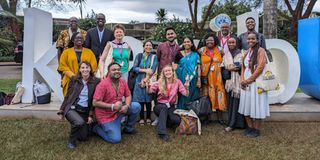Youths call for action on global issues at historic UN summit

Right Here Right Now II coalition members at the United Nations Office in Nairobi during the United Nations Civil Society Conference.
Susan* was already having a hard time when she went to the hospital.
She had to deal with the stigma and social pressure of being a teenage mother.
So she thought it would be easier in the hospital, where she hoped the medical staff would be understanding and accommodating. She was wrong.
"Getting quality reproductive healthcare in hospitals is quite a challenge, especially for us adolescent mothers," recounts Susan.
"When I was pregnant and went for antenatal care at a public hospital, the nurse attending to me shamed me, calling me 'immoral' for all to hear. This made me avoid subsequent appointments until delivery, where I experienced obstetric violence in yet another public facility. I’ve heard similar experiences from other teen mothers I interacted with. By giving us a chance to speak up and contribute to the "Pact for the Future" document, we can change this narrative. We are not just the future; we are the present."
Susan is one of the youth who participated in the United Nations Civil Society Conference on May 9-10.
The historic event, the first of its kind in Africa, was held at the United Nations Office in Nairobi.
The conference, attended by over 3,000 delegates, civil society, government officials and global leaders, aimed to shape the upcoming "Pact for the Future."
This critical document, to be adopted in September 2024 during the "Summit of the Future" in New York, will guide global development agendas for years to come.
Sexual and reproductive health
According to the United Nations Population Fund (UNFPA), these trends pose substantial risks to progress on global goals, including sexual and reproductive health and rights (SRHR).
The "Summit of the Future" is a transformative event, aiming to reaffirm the UN's commitment to its Charter and accelerate the implementation of current global commitments while addressing emerging challenges.
The summit will cover five essential areas: sustainable development and financing, international peace and security, science and technology, youth and future generations and the transformation of global governance.
The UN's commitment to global development has evolved through the Millennium Development Goals (MDGs) between 1990 and 2015 and the current Sustainable Development Goals (SDGs).
While these frameworks have achieved notable successes, progress remains uneven, particularly in developing nations.
The "Pact for the Future" seeks to address these disparities by fostering a more inclusive, equitable and sustainable global governance framework.
In a demonstration of engagement, the Network for Adolescent and Youth of Africa (NAYA) facilitated a dialogue involving over 40 civil society organisations and 200 young people.
This dialogue resulted in a position paper reflecting the collective demands of youth regarding the "Pact for the Future."
The paper underscores the importance of integrating young voices into global decision-making processes to ensure that future development frameworks are relevant, practical, and innovative.

UN Secretary-General António Guterres (at podium) addresses the closing session of the UN Civil Society Conference in Nairobi, Kenya.
According to Robert Aseda, the Head of Programmes at NAYA, they decided to engage the youth in the dialogue because they believe the voices of young people are critical in ensuring that the development agenda is alive to their realities and situations.
“There are several conventions that call on states to ensure that the voices of young people are included in decision-making," he said.
"Meaningful youth participation in decision-making is not just a policy and legal requirement but there’s evidence that when young people are engaged, everyone benefits from their creativity, ingenuity, their passion, energies and networks. We held the consultations with young people because they are the most affected by these issues and it’s only fair that they have a platform to ensure the development framework does not exclude them and their lived realities."
Deep concerns
The position paper, which emerged from virtual and physical meetings, outlines deep concerns about the ongoing challenges in SRHR faced by adolescents and young people.
Also read: Damp pads, itchy discomfort: A slum girl's menstrual struggles in rainy season
Despite progress in various developmental frameworks, these challenges persist, exacerbated by inadequate access to youth-friendly health services and information, socio-cultural barriers, and restrictive norms.
Issues such as high rates of sexually transmitted infections, unintended pregnancies, maternal morbidity, and sexual and gender-based violence remain prevalent among young populations.
During the conference, discussions among the youth present reflected that despite advancements, issues such as high rates of sexually transmitted infections, unintended pregnancies, maternal morbidity, and gender-based violence remain prevalent.
These problems are compounded by inadequate access to youth-friendly health services and socio-cultural barriers like stigma and restrictive norms surrounding youth sexuality.
“During our consultations young people stressed that they want to be engaged more in the development of the Pact for the Future. They want their issues to strongly feature in the agreement because they are the most affected by the major issues. Young people also emphasized that they need access to nonjudgmental youth friendly reproductive health services and information that are responsive to their needs,” notes Mr Aseda.
The conference, officially closed by UN Secretary-General António Guterres and Kenyan President Dr William Ruto, highlighted the urgent need for renewed global cooperation in the face of significant megatrends such as climate change, shifting population dynamics, and technological advancements.
As the world prepares for this summit, youth voices will be crucial in crafting an equitable, sustainable and inclusive future for all generations.



